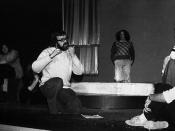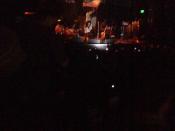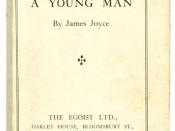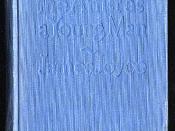In A Portrait of the Artist as a Young Man, Joyce explores the motivating forces that create an artist. His protagonist, Stephen, embodies the youthful promise of an individual seeking independence through introspection and artistry. Stephen's life is reveled to the reader through a series of episodes that trace his evolution from an infant to a young man. It is through the novel's many well-developed scenes that the reader experiences Stephen's acquisition of confidence and determination to improve himself. However, it is in Joyce's secondary characters, that the reader further understands Stephen and the outside forces that shape his life. Simon Dedalus, Stephen's father, plays a key role in Stephen's development. It is through Simon's development as a character that the reader truly understands Stephen's history. Stephen's feelings of isolation and distance from those around him are caused, in some part, from his father's inability to show affection.
In Simon, the reader sees one of the most thoroughly developed of Joyce's characters; for he is a good-hearted man strong in his beliefs, but incapable of transcending the past and providing his son with the respect and encouragement he so desperately desires.
The reader is immediately introduced to Stephen's father. Even as an infant, Stephen is able to visualize his father. This opening portrayal of Simon by Stephen immediately introduces the father/son dynamic and gives readers something to reflect on throughout the book. Stephen's immediate interpretation of his father is simply based on physical appearance. "His father looked at him through a glass: he had a hairy face (Joyce, 3)." It is from this simple sentence that Simon is introduced. From this point, throughout the rest of the novel, Joyce develops Simon Dedalus psychologically and emotionally and leaves the readers to conclusively decide how he has changed his son's life.
During the Christmas dinner episode, Stephen is caught in the middle of a bitter argument about the political controversy and instability of Ireland. In this scene, the reader sees that Simon Dedalus is an undying Irish Nationalist so passionate about his political affiliation he is willing to sacrifice a peaceful family gathering at Christmas in an attempt to argue his position. This event has a definite impact on Stephen, as his nurse Dante suggests during the argument. Later in the novel, as Stephen is struggling to create his own political identity, the reader recalls the Christmas scene. Stephen's idealistic political community is in absolute contrast to his father's perceptions. This political disconnection that separates the two foremost provides another example of Simon's inability to connect with his son. Moreover, it reveals Stephen's advanced maturity and astounding ability to observe the hypocrisy and corruptive nature of politics; something his father is too close-minded to understand.
Chapter one ends with Stephen feeling as though he has achieved heroic stature by standing up to his private school administrators and refusing to accept unjust punishment. At the end of this significant event in the novel, Stephen is surrounded by his classmates and listening to their cheers. However, early in the second chapter Stephen learns that when his father spoke to the school parishioners they shared a "famous laugh together over it (Joyce, 76)." This outright rejection from his father may not have been intentional but it is the first clear event that distances Stephen from Simon. His father's mockery of this very important event causes Stephen to become much more introspective and private. He is unable to express himself freely with his father for fear of being laughed at once again. This event in the novel marks a clear change in Stephen's character. For the rest of the novel Stephen becomes increasingly secluded and isolated from those around him.
Simon Dedalus is unable to understand Stephen's increasing feelings of isolation. When on a train to Cork, the novel's narrator describes Stephen's emotions as he listens to his father's stories: "He listened without sympathy to his father's evocation of Cord and of scenes of his youth, a tale broken by sighs or draughts from his pocketflask whenever the image of some dead friend appearedâ¦Stephen heard but could feel no pity (Joyce, 92)." The reader's knowledge about Simon has increased greatly from the physical description on the first page of the novel. Simon's nostalgia is so severely crippling to his relationship with Stephen that by this point on the train, Stephen feels no emotion with his father. The father's continuing dependence of alcohol is also introduced here, providing yet another way in which Stephen is separated from his father.
Simon's incessant desire to live in the past as well as his drinking are further explored when the two take a trip to a town market. After a series of embarrassing episodes, Stephen feels as though his father is a humiliation. At this moment, the reader begins to realize the complexity of Stephen's relationship with his father. Paternal codes suggest that the father's role is to provide for his family and support his family in any capacity necessary. Though Simon is portrayed as a fairly good man his inability to fulfill his duties as a father makes him a failure. Walking through town, as well as in earlier bar scenes, Simon is so incapable of protecting and caring for Stephen that it is young Stephen who becomes the responsible individual. The pressure placed unintentionally by Simon becomes a decisive factor in Stephen's eventual decision to break his relationship with Simon. The shame Stephen has for his father's failures becomes so great that he needs to become more reliant on himself in order to relieve the humiliation.
Late in the novel, Stephen's family is forced to move to another home as a result of Simon's financial squandering. When Stephen learns of this, he no longer acts out or becomes emotional. Instead, he quietly reflects on his siblings and the effect that his father is having on him and his family. "He was listening with pain of spirit to the overtone of weariness behind their frail fresh innocent voices. Even before they set out on life's journey they seemed weary already of the way (Joyce, 177)." Like the aforementioned scenes, this episode marks a clear transition in the novel. From here until the conclusion, Stephen's separation from his father is explored. Stephen's description of his family reflects depressingly on Simon. Stephen's criticism of his father is arguably most extreme in this example. Stephen's thoughts reveal to the reader that he thinks of his father as the equivalent of a murderer. Simon's failures as a father have taken the life out of Stephen and his siblings and left them hopeless and tired. They are so disappointed with life that their childhood innocence has been replaced with a pessimistic outlook on society.
The conclusion of the novel clearly shows the readers that Stephen rejects his father. Stephen's final journal entry before leaving to go to America is a simple sentence that eloquently sums up Stephen's relationship with Simon. "27 April: Old father, old artificer, stand me now and ever in good stead (Joyce, 276)." Throughout the novel Stephen experiences many negative moments with his father. At the end, the newly emerged artist understands his father's failures and accepts them, while at the same time exiting the relationship in hopes of creating a new existence for himself. His journal entry is referring to his mythological namesake Daedalus. Stephen is calling Daedalus his true father and asking for his help on his journey as an artist. This rejection of his family for the opportunity to follow what he feels he needs takes Stephen to America. The somber ending to the novel marks the end of Stephen's childhood and the beginning of his new life.
Simon plays a very large role in Stephen's eventual realization that it is his call in life to become an artist. Through the entire novel the reader sees instances when Stephen feels isolated and alone. Careful thought about this reveals that much of Stephen's isolation is due to his father. Directly, Simon separates himself from his son because he is such an alcoholic, nostalgic man he becomes both physically and mentally unable to help his son. Indirectly, his incapacity to be a financial provider places the family in impoverished communities where Stephen is unable to truly develop his skills.
Readers are given a plethora of examples with which to evaluate Simon's role as a father and his shortcomings with Stephen. Even for all of his faults however, the reader is able to sympathize with him. For at his soul he is a good man. His development as a character is a testament to Joyce and his ability to reveal true human emotions through words. Simon is thought of as a good-natured character because he never intentionally drove his son away. His shortcomings as a father therefore, are a sad commentary on paternal figures and their ability to unite with young, formidable boys like Stephen.
Simon is a remarkable character and he is perhaps the easiest character in the novel to relate to. After all so many fathers have wanted desperately the gain the love of their sons; while so many sons have never been able to get their fathers to understand them. Simon is no longer the simple hairy face that he once was. To Stephen, his father has become an emotionless old man, unable to understand him. The timeless dynamic involving the love of father and son and the inability of both to show emotion and connect on a deep emotional level resonates in the minds of the readers. Stephen's negative relationship with Simon is a motivating factor is his final decision to become an artist. However, Joyce's portrayal of Stephen often suggests that life as an artist is not a positive thing. Because of this, at the end of the novel the reader is left with the romantic aspiration that somehow Simon and Stephen can reunite and become the father and son pair that they both wanted but were never able to achieve.
Work Cited Joyce, James. A Portrait of the Artist as a Young Man New York: Penguin Group. 1993.





